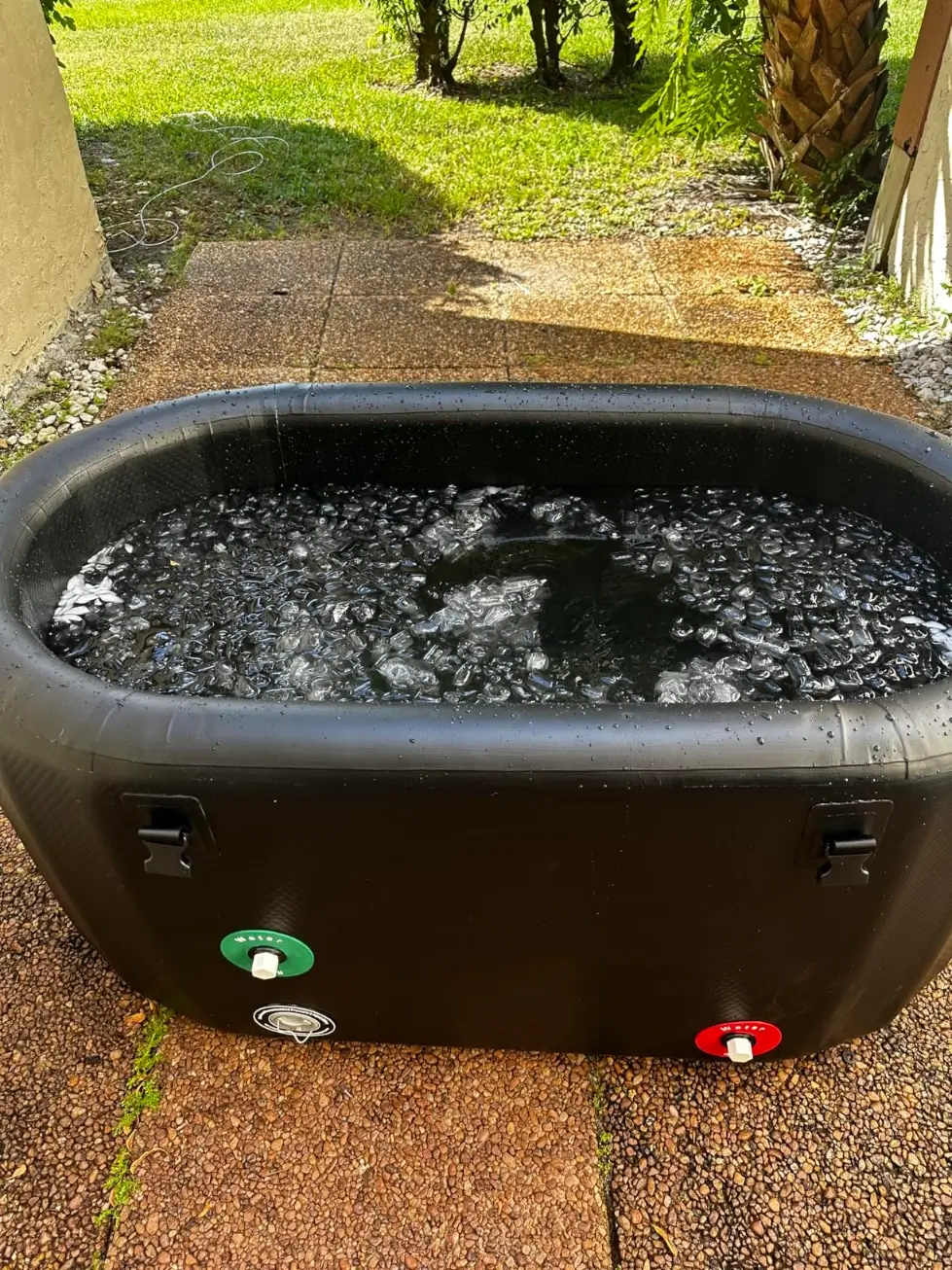5 Differenze tra bagni di ghiaccio e docce fredde
5 Differenze tra bagni di ghiaccio e docce fredde
Ice baths and cold showers are both methods of body cooling using cold water, but there are some differences between them:
1.Cooling rates in water baths, bagni di ghiaccio
An ice bath is the immersion of an object in a mixture of ice and water. Because of the low temperature of the medium (near 0°C or 32°F), it provides a very intense and rapid cooling effect. Ice baths quickly lower skin temperature, promote vasoconstriction, reduce muscle pain and inflammation, and increase the body’s rate of recovery.
Al contrario, cold showers are usually slightly warmer, usually between 10°C (50° f) and 20°C (68° f), and have a slightly weaker cooling effect than ice baths, but still provide a cool and soothing sensation.
FURTHER READING

2.Type of immersion
An ice bath is a complete immersion of the body in ice water, usually in a bathtub or vat. This full-body immersion allows the ice water to fully cover the entire surface of the body, allowing for rapid cooling of the entire body.
A cold shower, d'altra parte, involves spraying cold water directly over the surface of the body, usually through a shower head or nozzle. Cold showers are primarily a localized cooler, especially for body parts that are exposed to the flow of water.
3.Convenience
Ice baths require sufficient ice or ice water and equipment for immersion, such as a bathtub or large bucket. Al contrario, cold showers are more convenient, requiring only the adjustment of the temperature of the faucet.
Of course, you can also try a portable ice bucket for ice bathing, which is inexpensive and collapsible (minimum fuss, maximum comfort).

4.Durata
Due to the much cooler temperatures of ice baths, the recommended soaking time is usually shorter, tipicamente 15 A 20 minuti. If you want to achieve the same results, a cold shower can certainly be longer than an ice bath.
5.Feeling and comfort
The cooling effect of an ice bath is more intense and may cause shivering and a tingling sensation on the skin, which may feel uncomfortable or even unbearable for some people.
Al contrario, cold showers are slightly warmer than ice baths and may be more tolerable.
COSÌ, if you’re just thinking about trying an ice bath, start slowly with a cold shower!

Choosing Wisely: Ice Baths or Cold Showers?
Summary of Key Differences
In the realm of cold therapy, ice baths and cold showers stand out as popular methods with distinct characteristics. Bagni di ghiaccio, with their frigid temperatures ranging from 50-59°F, provide intense cooling effects that trigger vasoconstriction and promote rapid muscle recovery.
D'altra parte, cold showers offer a more moderate experience with temperatures around 68-72°F, stimulating metabolism and boosting energy levels through increased heart rate. These temperature variations lead to diverse physiological responses in the body, emphasizing that each method offers unique benefits tailored to different needs.
Aligning Personal Goals and Preferences
When deciding between ice baths and cold showers, it is crucial to consider personal goals and preferences in terms of physical recovery, mental resilience, and overall well-being. Athletes or individuals seeking quick muscle recovery may lean towards the invigorating plunge of an ice bath, relishing its immediate impact on circulation and inflammation reduction.
Al contrario, those inclined towards a daily wellness routine focused on mental rejuvenation might find solace in the refreshing embrace of a cold shower’s mood-boosting effects.
Whether opting for the bracing chill of an ice bath or relishing in the enlivening cascade of a cold shower, the key lies in understanding one’s aspirations and selecting a practice that not only fulfills them but also enriches daily life.
May your exploration into the world of icy rejuvenation bring you closer to achieving your optimal state of well-being, one invigorating dip at a time!
Prima della partita
Vuoi anche conoscerli…
Prima della partita
5 Differenze tra bagni di ghiaccio e docce fredde
Ice baths and cold showers are both methods of body cooling using cold water, but there are some differences between them:
1.Cooling rates in water baths, bagni di ghiaccio
An ice bath is the immersion of an object in a mixture of ice and water. Because of the low temperature of the medium (near 0°C or 32°F), it provides a very intense and rapid cooling effect. Ice baths quickly lower skin temperature, promote vasoconstriction, reduce muscle pain and inflammation, and increase the body’s rate of recovery.
Al contrario, cold showers are usually slightly warmer, usually between 10°C (50° f) and 20°C (68° f), and have a slightly weaker cooling effect than ice baths, but still provide a cool and soothing sensation.
FURTHER READING

2.Type of immersion
An ice bath is a complete immersion of the body in ice water, usually in a bathtub or vat. This full-body immersion allows the ice water to fully cover the entire surface of the body, allowing for rapid cooling of the entire body.
A cold shower, d'altra parte, involves spraying cold water directly over the surface of the body, usually through a shower head or nozzle. Cold showers are primarily a localized cooler, especially for body parts that are exposed to the flow of water.
3.Convenience
Ice baths require sufficient ice or ice water and equipment for immersion, such as a bathtub or large bucket. Al contrario, cold showers are more convenient, requiring only the adjustment of the temperature of the faucet.
Of course, you can also try a portable ice bucket for ice bathing, which is inexpensive and collapsible (minimum fuss, maximum comfort).

4.Durata
Due to the much cooler temperatures of ice baths, the recommended soaking time is usually shorter, tipicamente 15 A 20 minuti. If you want to achieve the same results, a cold shower can certainly be longer than an ice bath.
5.Feeling and comfort
The cooling effect of an ice bath is more intense and may cause shivering and a tingling sensation on the skin, which may feel uncomfortable or even unbearable for some people.
Al contrario, cold showers are slightly warmer than ice baths and may be more tolerable.
COSÌ, if you’re just thinking about trying an ice bath, start slowly with a cold shower!

Choosing Wisely: Ice Baths or Cold Showers?
Summary of Key Differences
In the realm of cold therapy, ice baths and cold showers stand out as popular methods with distinct characteristics. Bagni di ghiaccio, with their frigid temperatures ranging from 50-59°F, provide intense cooling effects that trigger vasoconstriction and promote rapid muscle recovery.
D'altra parte, cold showers offer a more moderate experience with temperatures around 68-72°F, stimulating metabolism and boosting energy levels through increased heart rate. These temperature variations lead to diverse physiological responses in the body, emphasizing that each method offers unique benefits tailored to different needs.
Aligning Personal Goals and Preferences
When deciding between ice baths and cold showers, it is crucial to consider personal goals and preferences in terms of physical recovery, mental resilience, and overall well-being. Athletes or individuals seeking quick muscle recovery may lean towards the invigorating plunge of an ice bath, relishing its immediate impact on circulation and inflammation reduction.
Al contrario, those inclined towards a daily wellness routine focused on mental rejuvenation might find solace in the refreshing embrace of a cold shower’s mood-boosting effects.
Whether opting for the bracing chill of an ice bath or relishing in the enlivening cascade of a cold shower, the key lies in understanding one’s aspirations and selecting a practice that not only fulfills them but also enriches daily life.
May your exploration into the world of icy rejuvenation bring you closer to achieving your optimal state of well-being, one invigorating dip at a time!
Prima della partita
Vuoi anche conoscerli…
A proposito di ciò che è autore

Benvenuti nel nostro blog! Il mio nome è Peter e sono l'autore principale di questo blog. Come professionista di recupero sportivo e con profondi interessi e competenze.
Mi impegno a presentare concetti complessi in modo chiaro e conciso, e consentire ai lettori di comprendere meglio e applicare tale conoscenza attraverso una ricerca approfondita e la condivisione dell'esperienza.
Grazie per la lettura e per il tuo supporto! Se hai domande o suggerimenti su uno qualsiasi dei contenuti, Non esitate a contattarmi. Non vedo l'ora di condividere informazioni più interessanti e utili con te e di crescere insieme in questo viaggio di conoscenza!
